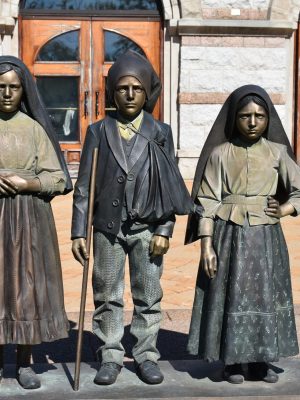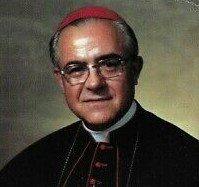“Jacinta did not rest until she brought her own family to a daily recitation of the rosary in common.”
-Cardinal Humberto Medeiros
The fruits of Jacinta’s generous cooperation with the grace of God are being manifested to us only now. In this chapter we shall attempt to summarize her apostolate following the transformation which took place under the influence of the apparitions.
Today, when it has become so necessary for all of us to work for the salvation of our brethren, but there is still so much misunderstanding, so much apathy and lack of good will, may the example and personality of the little apostle Jacinta Marto strengthen and encourage those engaged in the front lines of the apostolate.
It may even convert and awaken certain lethargic souls. The love of God is unique in this: the more intense it is, the more does it wish to communicate itself. Its only desire is to see Love more and more loved by all creatures.
The saints pine away with love. Filled with grief, Saint Francis of Assisi roamed through the forests exclaiming, “Love is not loved, Love is not loved!” The life of Jacinta was a growing absorption in God, with Whom she became enamored, and for Whose glory she sacrificed herself.
Only a person who likes to dance knows what a sacrifice it is suddenly to forego this entertainment. Lucia tells us that the shepherds on the mountain and the children of her age gave up dancing because the three little friends decided to give it up. Jacinta was the one who loved to dance. She could dance more artistically than the other two.
Sister Maria de Jesus writes:
“Around the Feast of Saint John (after the second apparition, that of July 13th), she told me: ‘Now I am not going to dance any more.’ ‘Why?’ ‘Because I want to offer this sacrifice to Our Lord.’ ‘And because we were the leaders in the games among the children, our example put an end to the dances which ordinarily were held on this occasion.”
Even then, Jacinta was the forerunner of a heroic and hidden (even if not unknown) spirit of sacrifice in renouncing an entertainment in which many of them saw no evil. May God bless and multiply such heroism!
In their eagerness to play, Jacinta and her two companions had been saying the rosary badly, merely pronouncing the first words of the Hail Mary and of the Our Father. Perhaps even on the day of the first apparition, the rosary had been said in that way.
After the apparitions, she was the one who immediately reminded the others of the obligation henceforth to say it well. Many times the thought of saying the rosary and the necessity of sacrifice, the mainspring of her new life, cut into her conversation and play. She knew well that it was only a dangerous illusion to want to do the work of her apostolate without prayer and sacrifice.
At home, even with her parents, she was never shy in the exercise of her apostolate. There she began the work of her conquest for Christ and of the perfection of her soul. In spite of all that has been said in praise of the Christian life and of the spirit of piety of the two families, the truth remains that not all should be taken literally. Not everything in them was perfect and worthy of imitation.
Far from it. The grace of the apparitions was not a reward of virtue and piety, but a free gift which our beloved country was to enjoy much more than the seers themselves or their families. Lucia’s father (may God rest him!) was many years without making his Easter duty, and his life was hardly edifying.
In Jacinta’s own family many days went by without the recitation of the rosary. Understanding that the first field of our apostolate of Catholic Action must be the family, Jacinta did not rest until she brought her own family to a daily recitation of the rosary in common. It was a joy to watch her approach her mother, tenderly and sweetly, trying to convince her to be faithful to this devotion. Jacinta did not desist from her pleas until she was assured that they all would really say the rosary together.
The fervor of charity and zeal for the salvation of souls fired her life and led her to immolate herself as a little victim in union with the suffering of Jesus for the salvation of sinners. It moved her to do the work of the apostolate wherever she was. We have seen her in jail overcome by sorrow at the thought of not seeing her parents again. But even there when Lucia simply reminded her of sinners, her tears dried in her eyes as if by magic.
“We decided then to say the rosary,” Lucia writes. “Jacinta took a medal which she wore around her neck, and asked one of the prisoners to hang it from a nail on the wall. Kneeling before the medal we began to pray. The prisoners prayed with us as best they knew. At least they knelt. When the rosary was over, Jacinta turned to the window and began to cry.”
“’Jacinta, don’t you want to offer this sacrifice to Our Lord?’ I asked her.”
“’Yes, but when I think of my mother, I cannot help crying.”
“Then, since the Blessed Virgin had told us to offer our prayers and sacrifices also in reparation for sins committed against her Immaculate Heart, we agreed among ourselves that each one of us should offer them for a different intention, one for sinners, one for the Holy Father, and one in reparation for the sins committed against the Immaculate Heart of Mary. When the agreement was made, I told Jacinta to choose the intention she liked.”
“I offer mine for all the intentions, for I like them all,” she said.
As the end approached, Jacinta noticed how little attention the people paid to the recommendations of Our Lady. She was grieved, and once in a while she revealed her anguish to her two companions. Once, during her illness, she turned to Lucia and said:
“Don’t you know Our Lord is sad? Our Lady told us that people should not offend Him any more because He is already much offended. But nobody listens. They go on committing the same sins.”
She fell ill, but not even in the hospital did her work for souls slacken. Like the lamp which before it goes out for want of oil, lets out a last glimmer and only then is extinguished, so it was with Jacinta, when she felt that life was departing, and that only a little time remained for her work.
She intensified the love and zeal which consumed her. In those last days, in order to make the most of the flickers of life which were left to her, she prayed, counseled, censured, and only then did she peacefully sleep in the Lord.
The immodest dress of some nurses, and the behavior of a few doctors, whom she supposed to be unbelieving, led her to remind them of eternity, and to ask them to avoid “luxury and immodest dress.” New revelations of Our Lady made her exclaim,
“Oh, I am so sorry for Our Lady, I am so sorry!”
And like the echo of the voice of the Blessed Virgin, she said solemnly that the sin which leads most people to perdition is the sin of impurity; that people must not grow hardened in sin, and that it is necessary to do much penance.
Always and everywhere Jacinta was a living example of virtue in action, conquering the souls of children and adults alike. Even before she entered the hospital, while living with a charitable person who had received her in her home, Jacinta did not lose an opportunity to do good, or to lead others to do better. To another little girl who lived in the same house, Jacinta recommended many times,
“Be very obedient, never be lazy, and never tell a lie.”
From the official questioning of Senhora Maria da Purificacao Godinho, made in the College of Our Lady of Fatima, on September 11, 1934, we extract the following information concerning Jacinta’s life during these last days:
“She did not play, ate little, did not complain about her illness; she said the rosary every day, did not like to hear lies, reprimanded persons who told them in her presence, and showed always a great love for truth. She asked this lady whenever she went to church to warn the persons whom she saw talking there. In case they did not receive her well and insulted her, she was to suffer all patiently for the love of Our Lord.”
“When she prayed from the balcony which looked into the Chapel of Our Lady of Miracles, she liked to be in a place where she could see the tabernacle. As she prayed thus, her attitude and the expression on her face, with her eyes fervently fixed on the tabernacle, made an impressive sight.”
While she was still at home in Aljustrel but already very sick, her cousin brought her a holy card with the chalice and host on it. She took it, kissed it fervently, and radiant with joy, as though wrapt in a beautiful dream or in a far-off vision, she told her,
“It is the Hidden Jesus. I love Him very much. I wish I could receive Him in church…Do you receive Communion in heaven? If they do, I am going to receive every day. I wish the angel would give me Communion again at the hospital. How happy I would be!”
“Sometimes as I returned from church and entered her house, she would ask me, ‘Did you receive?’”
“If I said yes, she added immediately, ‘Come very close to me, because you have in your heart the Hidden Jesus.’”
“At other times, she would tell me, ‘I don’t know how it is. I felt Our Lord inside of me, I understand what He tells me, but I do not see or hear Him. But it is so good to be with Him.’”
“At six o’clock in the afternoon of Friday, the 20th of February, Jacinta said she felt very ill, that she wished to receive the sacraments. The pastor of the parish was called. He heard her confession about eight o’clock that evening. They told me that the little girl insisted that the Holy Viaticum be brought to her, but the pastor refused, since he thought that she looked well.”
“However, he promised to bring Our Lord on the following day. The little girl persisted in asking for Holy Communion, saying that she would die shortly. In fact, at ten-thirty that evening, she died in the greatest tranquility.”
She passed away without having received Communion, except from the hands of the Angel during the apparition at the Cabeco. Jacinta never made her First Holy Communion, not even as Viaticum. Her father thinks she did, but the pastor and Sister Maria Lucia, with whom we spoke, say that he has confused Jacinta with Teresa Marto, her sister, who was Lucia’s partner in their First Communion. This is not surprising. The prejudice against giving Communion to very young children was still widespread. The precept of Pius X in regard to frequent Communion was not being fulfilled. Solemn Communion was given between the ages of ten and twelve, and generally this was the First Communion. The contrary was the exception. Only God knows the suffering of that little heart, enamored of the Eucharistic Jesus, and kept far way from Him. I suppose that it was the greatest immolation of little Jacinta. Through it may we obtain the grace of seeing children receive early, often, and fervently.
This article is taken from a chapter in Jacinta The Flower of Fatima by Humberto Medeiros which is available from TAN Books.









